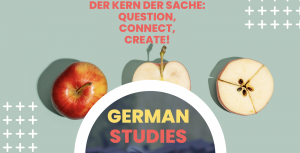Graduate
 The Graduate Program in German Studies offers research, teaching, and professional training in many different and interdisciplinary areas of German Studies leading to the degrees of M.A. or Ph.D.. The graduate program strongly supports an interdisciplinary, intercultural, and transnational approach to German Literary and Cultural Studies and Linguistics. Admission is competitive, and qualifying graduate students are financially supported by teaching or research assistantships.
The Graduate Program in German Studies offers research, teaching, and professional training in many different and interdisciplinary areas of German Studies leading to the degrees of M.A. or Ph.D.. The graduate program strongly supports an interdisciplinary, intercultural, and transnational approach to German Literary and Cultural Studies and Linguistics. Admission is competitive, and qualifying graduate students are financially supported by teaching or research assistantships.
The expertise of our faculty covers the entire modern spectrum from German Classicism and Romanticism via Modernism and Holocaust Studies to East/West German literature and film, “Gegenwartsliteratur” by German-speaking authors of different national and cultural backgrounds, and literature and digital media. All faculty cover additional fields and specialities such as applied linguistics, art history, media studies, pop literature, scholarly communication, human rights, environmental studies, intercultural communication, digital humanities and more. In general, faculty members are experts in particular theories and periods, beginning with the 18th century, but all have subfields and venture into new interdisciplinary territory on a regular basis. Students gain in-depth insights into the methodology of teaching foreign languages as part of their training that supports their careers far beyond potential teaching assignments. Most importantly, every faculty member is eager to explore new and innovative questions and paths together with each graduate student. Our mentoring offers one-on-one advising throughout your studies, collaboration on research and teaching projects, conference, publication, networking and internship support, and regular workshops and clinics to address up-to-date research, teaching and professionalization questions such as online portfolios, job search, writing processes, and multimodal scholarship.
Given the emphasis on interdisciplinarity in our program, we also encourage applicants for the Integrative Studies PhD, a course of study that combines two or more fields of inquiry and professionalization. German Studies at UConn is well positioned to interface with a number of areas beyond those mentioned above and including different departments or schools.
Our graduates are indicative of the graduate program’s success: they are employed in a multitude of sectors, including academic positions (for example, at Vanderbilt University, Wayne State University, University of Denver, University of Connecticut, University of Puerto Rico, Utrecht University of Applied Sciences); they have taken their UConn MA in German Studies to renowned PhD programs (Cornell University, the University of Texas, the Johns Hopkins University); and they have built successful business careers in a variety of sectors or are working in internationally oriented positions, including IT, law, and grant-writing. A LinkedIn group for networking purposes will help to connect you with our alums for more information.
Diverse areas of expertise of German Studies faculty
Optional Graduate Certificates in addition to the degree in German Studies
Many graduate students opt to complete additional graduate certificates, among others:
- Human Rights Graduate Certificate
- Certificate in Women’s, Gender and Sexuality Studies in our Women’s, Gender and Sexuality Studies program
- Cognitive Science Certificate
- Digital Humanities and Media Studies Certificate
Students apply to Graduate Certificate programs at the University of Connecticut Graduate School.
Qualifying graduate students are financially supported as teaching, administrative and/or research assistants. The Graduate Program in German Studies is linked to a rigorous undergraduate language and pedagogy program. All instructors – faculty and teaching assistants – participate in an integrated approach to cultural and linguistic inquiry, and all are involved in the articulation of the entire Curriculum. Teaching assistants are introduced to language teaching research and methodologies with particular emphasis on teaching towards intercultural and linguistic competencies, beginning with elementary German language and culture classes. Your creative work in the classroom is of great value to the entire German Studies program!
The German section at the University of Connecticut is nationally known for its innovative undergraduate curriculum, including interdisciplinary programs such as Eurotech (leading to a undergraduate dual degree, B.A. in German and B.S. in Engineering) or Eurobiz (leading to a undergraduate dual degree, B.A. in German and B.S. in Business).

Graduate Handbook
Applicants for the M.A. and Ph.D. programs find valuable information in the Graduate Handbook of the Department of Literatures, Cultures and Languages.pdf.
Application
Send your application — for both admission to the graduate program and a graduate assistantship — to Graduate Admissions along with your fee payment, completed forms, cover letter, your degree(s), transcripts, language exam scores, recommendations, short German and English samples of your written work. For more information or to consult with the Graduate Program director, please write to anke.finger@uconn.edu.
Contact
All potential applicants are encouraged to inquire about the graduate program with the Director of the German Studies Graduate Program, Prof. Anke Finger: anke.finger@uconn.edu
Associations and Organizatio
- American Association of Teachers of German
- American Council for the Teaching of Foreign Languages
- American Friends of Marbach
- American Institute for Contemporary German Studies
- Deutscher Germanistenverband
- German Studies Association
- Germanistenverband im Südlichen Afrika
- Gesellschaft für Interkulturelle Germanistik
- H-Net Germanistik
- Internationaler Deutschlehrerverband
- Internationale Vereinigung fuer Germanistik
- Austrian Studies Association
- Modern Language Association
- Women in German